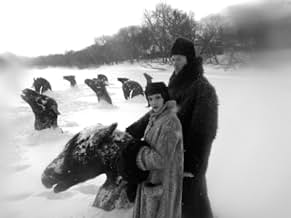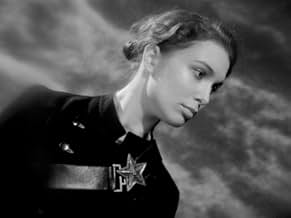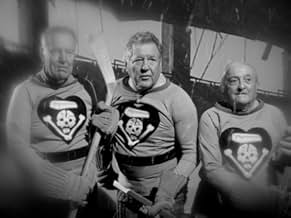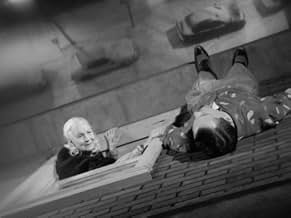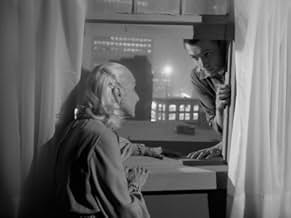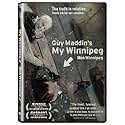VALUTAZIONE IMDb
7,5/10
5864
LA TUA VALUTAZIONE
Aggiungi una trama nella tua linguaFact, fantasy and memory are woven seamlessly together in this portrait of film-maker Guy Maddin's home town of Winnipeg, Manitoba.Fact, fantasy and memory are woven seamlessly together in this portrait of film-maker Guy Maddin's home town of Winnipeg, Manitoba.Fact, fantasy and memory are woven seamlessly together in this portrait of film-maker Guy Maddin's home town of Winnipeg, Manitoba.
- Regia
- Sceneggiatura
- Star
- Premi
- 4 vittorie e 17 candidature totali
Recensioni in evidenza
Winnipeg is to Guy Maddin as Baltimore is to John Waters. It's very unfashionability is its inspiration. But where Waters dwells on hairspray and bouffant dresses and twisted vowels, Maddin describes Winnipeg as a place of perpetual snow, destroyed hockey rinks, and sleepwalkers. "Winnipeg, Winnipeg, Winnipeg, Winnipeg...." he begins his incessant voice-over as the first of his typically distressed, nostalgic black and white images in square format appear showing long-ago men and women walking in snow-covered streets and a man dozing in a train car whose big window is like a movie screen showing figures and the big face of his mother. Sometimes blurry phrases flicker onto the screen echoing his words, like a refrain.
The man (Darcy Fehr) is meant to be himself, getting out of town. "I've got to leave it, I've got to leave it," he chants, and then speculates that maybe he can film his way out of Winnipeg, putting all his past on celluloid and thereby ridding himself of its fascination so he can move elsewhere.
For this poem and rant about his native city, which he says he wants to leave and can't, Maddin hired actors to play his mother and some of his siblings and borrowed his girlfriend's pug to stand in for the childhood chihuahua. He leased their old house and moved the old furniture (or facsimiles) into it, distributing a runner carpet and shabby couches in the living room and an old TV. His mother is played by veteran B-picture vixen Ann Savage. Black and white images of what purports to be his real family back in the Fifties flash on the screen alternating with their hired look-alikes as Maddin spins arcane anecdotes about his childhood and drops in the occasional fact. An old department store and a restaurant that served orange jello figure prominently, as does the dynamiting of a treasured tree and a hockey arena. If there is a logic to this quirky ramble, it's as sui generis as you can get.
We don't come away with a sense of Maddin's actual past, because all his anecdotes seem highly embroidered, like his mother's grabbing some friends' 75-year-old myna bird--which ran free in the house and had "a large vocabulary"--and smashing it to the floor because she was afraid of birds. Or the family threatening their mother with a parakeet to make her get out of bed and cook them a meatloaf. Or the team of ancient hockey stars, all suited up, one known to be dead his face all covered in bandages, playing in a half-destroyed arena, while Maddin sings their praises and curses the establishment of the NHL, which he regards as the beginning of the end. He says his father was a hockey executive, and he grew up in the locker room--was even born in the dressing room of the Winnipeg Maroons. According to him, Winnipeg has a secret network of back streets that parallels the main ones, and to pacify two rival taxi companies one was allowed to ride only on the main streets and the other only on the back alleys, where the ride over the snow is cushiony. The city he invents has an annual "If Day" when the town is invaded by mock Nazis who rename it "Himmlerstadt." A racetrack fire disaster caused a dozen horses to become buried in the earth with just their giant heads out of the snow in attitudes of agony. People come later to visit and picnic. In the family living room they watch a show called "Ledge Man" every day (it's run "for fifty years") in every episode of which the actress playing Maddin's mother talks the actor playing Maddin out of jumping from a ledge to his death.
Maddin calls this film, done for the "Documentary Channel," a "docu-fantasia," and that's what it is--sort of. It's hard to pin a genre to his film-making and this one is also an imaginary autobiography. He depicts himself living in an insular snow-globe parallel universe (sometimes fake slant lines of white snow are superimposed on scenes)--like the parallel system of back streets. The voice-over is a kind of crotchety incantation; Maddin has said this could be called "A Self-Destructive Sulk." What entertains, in its fey and offbeat way, is the man's humorous detachment; what appeals is the sense of a cozy far-off snowed-in world whose present is so remote it's like its past, a town that isn't very old but seems as if it is. For all the detail about growing up in a hairdressing establishment, lying in the living room with the family watching TV, being trapped in an indoor swimming pool complex on three levels among naked boys with "hairless boners" who refuse to swim, there's no sense of personal revelation at all, any more than in Dylan Thomas' "A Child's Christmas in Wales." And in his interweaving of the invented and the real, the contemporary and the archival in flickering dreamlike images, this movie has the power to enchant.
But also to numb. If Winnipeggers are sleepwalkers, the viewers of 'My Winnipeg' may at moments become sleep-sitters. And yet for a filmmaker so obviously withdrawn and secretive, this is his most autobiographical and perhaps most accessible and appealing work so far. "Amusing, elegant, inconsequential and it doesn't overstay its limited welcome," a London critic writes. I guess that's fair.
The man (Darcy Fehr) is meant to be himself, getting out of town. "I've got to leave it, I've got to leave it," he chants, and then speculates that maybe he can film his way out of Winnipeg, putting all his past on celluloid and thereby ridding himself of its fascination so he can move elsewhere.
For this poem and rant about his native city, which he says he wants to leave and can't, Maddin hired actors to play his mother and some of his siblings and borrowed his girlfriend's pug to stand in for the childhood chihuahua. He leased their old house and moved the old furniture (or facsimiles) into it, distributing a runner carpet and shabby couches in the living room and an old TV. His mother is played by veteran B-picture vixen Ann Savage. Black and white images of what purports to be his real family back in the Fifties flash on the screen alternating with their hired look-alikes as Maddin spins arcane anecdotes about his childhood and drops in the occasional fact. An old department store and a restaurant that served orange jello figure prominently, as does the dynamiting of a treasured tree and a hockey arena. If there is a logic to this quirky ramble, it's as sui generis as you can get.
We don't come away with a sense of Maddin's actual past, because all his anecdotes seem highly embroidered, like his mother's grabbing some friends' 75-year-old myna bird--which ran free in the house and had "a large vocabulary"--and smashing it to the floor because she was afraid of birds. Or the family threatening their mother with a parakeet to make her get out of bed and cook them a meatloaf. Or the team of ancient hockey stars, all suited up, one known to be dead his face all covered in bandages, playing in a half-destroyed arena, while Maddin sings their praises and curses the establishment of the NHL, which he regards as the beginning of the end. He says his father was a hockey executive, and he grew up in the locker room--was even born in the dressing room of the Winnipeg Maroons. According to him, Winnipeg has a secret network of back streets that parallels the main ones, and to pacify two rival taxi companies one was allowed to ride only on the main streets and the other only on the back alleys, where the ride over the snow is cushiony. The city he invents has an annual "If Day" when the town is invaded by mock Nazis who rename it "Himmlerstadt." A racetrack fire disaster caused a dozen horses to become buried in the earth with just their giant heads out of the snow in attitudes of agony. People come later to visit and picnic. In the family living room they watch a show called "Ledge Man" every day (it's run "for fifty years") in every episode of which the actress playing Maddin's mother talks the actor playing Maddin out of jumping from a ledge to his death.
Maddin calls this film, done for the "Documentary Channel," a "docu-fantasia," and that's what it is--sort of. It's hard to pin a genre to his film-making and this one is also an imaginary autobiography. He depicts himself living in an insular snow-globe parallel universe (sometimes fake slant lines of white snow are superimposed on scenes)--like the parallel system of back streets. The voice-over is a kind of crotchety incantation; Maddin has said this could be called "A Self-Destructive Sulk." What entertains, in its fey and offbeat way, is the man's humorous detachment; what appeals is the sense of a cozy far-off snowed-in world whose present is so remote it's like its past, a town that isn't very old but seems as if it is. For all the detail about growing up in a hairdressing establishment, lying in the living room with the family watching TV, being trapped in an indoor swimming pool complex on three levels among naked boys with "hairless boners" who refuse to swim, there's no sense of personal revelation at all, any more than in Dylan Thomas' "A Child's Christmas in Wales." And in his interweaving of the invented and the real, the contemporary and the archival in flickering dreamlike images, this movie has the power to enchant.
But also to numb. If Winnipeggers are sleepwalkers, the viewers of 'My Winnipeg' may at moments become sleep-sitters. And yet for a filmmaker so obviously withdrawn and secretive, this is his most autobiographical and perhaps most accessible and appealing work so far. "Amusing, elegant, inconsequential and it doesn't overstay its limited welcome," a London critic writes. I guess that's fair.
It's so hard to write about a Guy Maddin film. What exactly do I describe, what do I say about the film? His films defy convention in every way imaginable. I can guarantee that there is no film out there that's even especially similar to "My Winnipeg" in style or content, even if Maddin's current style is essentially a pastiche of a particular sort of silent film, there are none that are edited in the same way or used to quite the same effect as Maddin's films are. At least none that I have seen, as Maddin is not imitating anyone, but making films in a style that is not used anymore, and had he been making films in the 1920's he might have been considered an innovator. "My Winnipeg" is a film I wish I was clever enough to make about any of the cities I've lived in and fallen in love with, and is original enough to captivating, but is also astonishingly clever and witty and funny and entertaining.
I was actually not a big fan of Maddin's last film, "Brand Upon the Brain!", a pleasant enough film but ultimately of no real worth or substance, merely a visually interesting retread of themes Maddin fans are familiar with. It was certainly a far cry from some of his better work- "Archangel" and "Careful" being my favorites. Maddin is certainly one of my favorite Canadian directors, and one of our few genuine auteurs whose work is actually accessible and available relatively easily, but there's always been an issue with his films, even his better work, the issue being that his films often feel rather insubstantial. Like the bizarre and amusing experiments of an eccentric than anything of real value (although obviously that is debatable). I always enjoy a Guy Maddin film, but I think "My Winnipeg" is the first of his which struck me as truly passionate or exceptional with regard to its content.
"My Winnipeg" tells you everything you need to know about it in the title. This is Guy Maddin's love/hate letter to his home town of Winnipeg, Manitoba, and it's really about HIS Winnipeg, and it's the sort of personal thing that could have so easily been a bore, but Guy Maddin is so interesting that his own perception of Winnipeg is enough to sustain this 80 minute film. It flies by, leaving the viewer in an appreciative daze by the end, appreciative of the remarkable sense of humor in the film, the wit, the cleverness of the narrative, and a real sense of Maddin's love and passion for Winnipeg. This film has everything that is appealing about Maddin's work as well as a new richness that he'd never quite found before. It's an oddly inspiring film, gorgeous to look at and rather unexpectedly the funniest film I've seen from 2008 as well.
I was actually not a big fan of Maddin's last film, "Brand Upon the Brain!", a pleasant enough film but ultimately of no real worth or substance, merely a visually interesting retread of themes Maddin fans are familiar with. It was certainly a far cry from some of his better work- "Archangel" and "Careful" being my favorites. Maddin is certainly one of my favorite Canadian directors, and one of our few genuine auteurs whose work is actually accessible and available relatively easily, but there's always been an issue with his films, even his better work, the issue being that his films often feel rather insubstantial. Like the bizarre and amusing experiments of an eccentric than anything of real value (although obviously that is debatable). I always enjoy a Guy Maddin film, but I think "My Winnipeg" is the first of his which struck me as truly passionate or exceptional with regard to its content.
"My Winnipeg" tells you everything you need to know about it in the title. This is Guy Maddin's love/hate letter to his home town of Winnipeg, Manitoba, and it's really about HIS Winnipeg, and it's the sort of personal thing that could have so easily been a bore, but Guy Maddin is so interesting that his own perception of Winnipeg is enough to sustain this 80 minute film. It flies by, leaving the viewer in an appreciative daze by the end, appreciative of the remarkable sense of humor in the film, the wit, the cleverness of the narrative, and a real sense of Maddin's love and passion for Winnipeg. This film has everything that is appealing about Maddin's work as well as a new richness that he'd never quite found before. It's an oddly inspiring film, gorgeous to look at and rather unexpectedly the funniest film I've seen from 2008 as well.
You could say that Guy Maddin makes films for the dreamers.
No other filmmaker alive puts so much effort into chipping away at the audience's sense of logic and running them through a grinder of their own twisted subconscious.
Beginning with his feature debut Tales from the Gimli Hospital in 1988, Maddin has remained furiously independent, the closest he's ever come to mainstream success being 2003's The Saddest Music in the World, which acted as a kind-of holy grail for film buffs and those obsessed with the days of cinema past. My Winnipeg may be the purest distillation of his unique aesthetic vision to date, almost surely because it's paradoxically the most personal and fantastical.
In essence, the film is a love-letter to Maddin's hometown of Winnipeg, Manitoba. It's a rueful love-letter though, because the film opens with the director hurriedly explaining that he needs to, has to leave forever. But he can't bring himself to do it. The solution? He'll hire actors to recreate scenes from his childhood, in a desperate attempt to attain some obscure kind of closure. In a fabulously inventive instance of casting, B-movie veteran Ann Savage (Edward G. Ulmer's Detour) plays his "real" mom playing herself.
Maddin augments the often hilarious film-within-a-film with bizarre "facts" about Winnipeg, like how it has the 10 times the sleepwalking rate of any other city or that Maddin himself was born in the locker room of the local hockey arena only to return three days later as a newborn to attend his first game. These half-truths attain a kind-of mythic status when combined with Maddin's haunting visuals that, like most of his filmography, harken back to the choppy, rapid-fire pace of German expressionism and the heart-on-sleeve emotion of '40s and '50s melodrama.
It shouldn't be surprising how funny My Winnipeg is, considering that Maddin might be the most unpretentious avant-garde filmmaker of all-time. His casual, matter-of-fact narration blends perfectly with the film's stark poetic images, making the many leaps of fancy that much more potent. When he describes a "secret" taxi company that operates only on Winnipeg's darkened back streets or ruminates on the beauty of "snow fossils" caused by plodding winter footsteps, it's downright impossible not to be overcome with feelings of deep nostalgia and wonder.
Maddin has made faux-biographical films before, 2006's Brand Upon the Brain the most notorious example, but with My Winnipeg, it feels like he's finally letting us in. Of course, it's just as likely that he's putting us on, and if he is, it's one of the most staggeringly beautiful con games ever committed to celluloid.
No other filmmaker alive puts so much effort into chipping away at the audience's sense of logic and running them through a grinder of their own twisted subconscious.
Beginning with his feature debut Tales from the Gimli Hospital in 1988, Maddin has remained furiously independent, the closest he's ever come to mainstream success being 2003's The Saddest Music in the World, which acted as a kind-of holy grail for film buffs and those obsessed with the days of cinema past. My Winnipeg may be the purest distillation of his unique aesthetic vision to date, almost surely because it's paradoxically the most personal and fantastical.
In essence, the film is a love-letter to Maddin's hometown of Winnipeg, Manitoba. It's a rueful love-letter though, because the film opens with the director hurriedly explaining that he needs to, has to leave forever. But he can't bring himself to do it. The solution? He'll hire actors to recreate scenes from his childhood, in a desperate attempt to attain some obscure kind of closure. In a fabulously inventive instance of casting, B-movie veteran Ann Savage (Edward G. Ulmer's Detour) plays his "real" mom playing herself.
Maddin augments the often hilarious film-within-a-film with bizarre "facts" about Winnipeg, like how it has the 10 times the sleepwalking rate of any other city or that Maddin himself was born in the locker room of the local hockey arena only to return three days later as a newborn to attend his first game. These half-truths attain a kind-of mythic status when combined with Maddin's haunting visuals that, like most of his filmography, harken back to the choppy, rapid-fire pace of German expressionism and the heart-on-sleeve emotion of '40s and '50s melodrama.
It shouldn't be surprising how funny My Winnipeg is, considering that Maddin might be the most unpretentious avant-garde filmmaker of all-time. His casual, matter-of-fact narration blends perfectly with the film's stark poetic images, making the many leaps of fancy that much more potent. When he describes a "secret" taxi company that operates only on Winnipeg's darkened back streets or ruminates on the beauty of "snow fossils" caused by plodding winter footsteps, it's downright impossible not to be overcome with feelings of deep nostalgia and wonder.
Maddin has made faux-biographical films before, 2006's Brand Upon the Brain the most notorious example, but with My Winnipeg, it feels like he's finally letting us in. Of course, it's just as likely that he's putting us on, and if he is, it's one of the most staggeringly beautiful con games ever committed to celluloid.
Meh. Whimsical/bitter reminiscing with lots of made up facts and anecdotes which you can imagine some audiences rocking with mirth to but which aren't all that clever or witty - they're just very whimsical.
eg (my spoof)
Grainy b/w shots of someone in a living room being offered a cup of tea and drinking it with a smile
Narrator: A cup of tea. A cup of tea. My mother would always offer visitors a cup of tea. What is this drink? This tea, cupped in porcelain, porcelain as white as the snow which falls outside onto our Winnipeg sidewalks? My mother served tea in a cup from a set her grandmother gave her, a cup which had come from the mayor's wife, who murdered her own sister, drowning her in a bath of Earl Grey. A drink of death. The cup of life. A cup of tea.
It's sort of like that, with a quick shot thrown in of the sister drowned in the bath of tea. 80 mins of that. Doesn't really have anything to say.
eg (my spoof)
Grainy b/w shots of someone in a living room being offered a cup of tea and drinking it with a smile
Narrator: A cup of tea. A cup of tea. My mother would always offer visitors a cup of tea. What is this drink? This tea, cupped in porcelain, porcelain as white as the snow which falls outside onto our Winnipeg sidewalks? My mother served tea in a cup from a set her grandmother gave her, a cup which had come from the mayor's wife, who murdered her own sister, drowning her in a bath of Earl Grey. A drink of death. The cup of life. A cup of tea.
It's sort of like that, with a quick shot thrown in of the sister drowned in the bath of tea. 80 mins of that. Doesn't really have anything to say.
God bless Guy Maddin. There is nobody else like him. He takes material from the cinematic past and reshapes it in his own completely unique way. He does all this from his own studio in the artistic backwater of Winnipeg. The results are funny, poignant, absurd, and magical. In this he draws on memories of his childhood, family, and community.
Lo sapevi?
- QuizDirector Guy Maddin provided live narration at many film festival screenings.
- Curiosità sui creditiTapioca Wrangler - Marnie Patuck
- ConnessioniFeatured in My Winnipeg: Live in Toronto (2008)
- Colonne sonoreWonderful Winnipeg
Written by Leon Naleway
Performed by The Swinging Strings (vocal by Jim Wheeler)
Courtesy Shawn Nagy
Played during the opening credits
I più visti
Accedi per valutare e creare un elenco di titoli salvati per ottenere consigli personalizzati
- How long is My Winnipeg?Powered by Alexa
Dettagli
- Data di uscita
- Paese di origine
- Siti ufficiali
- Lingua
- Celebre anche come
- 나의 위니펙
- Luoghi delle riprese
- Aziende produttrici
- Vedi altri crediti dell’azienda su IMDbPro
Botteghino
- Budget
- 600.000 USD (previsto)
- Lordo Stati Uniti e Canada
- 159.363 USD
- Fine settimana di apertura Stati Uniti e Canada
- 14.309 USD
- 15 giu 2008
- Lordo in tutto il mondo
- 316.743 USD
- Tempo di esecuzione1 ora 20 minuti
- Colore
- Mix di suoni
- Proporzioni
- 1.33 : 1
Contribuisci a questa pagina
Suggerisci una modifica o aggiungi i contenuti mancanti

Divario superiore
By what name was My Winnipeg (2007) officially released in India in English?
Rispondi






